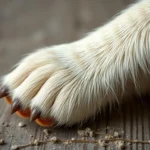
Introduction
Caring for our furry companions goes beyond simple affection; it encompasses ensuring their overall health and well-being. One of the critical aspects of dog health care is maintaining optimal eyesight, as vision plays a vital role in a dog’s interaction with the world. Dogs rely heavily on their vision for navigation, play, and social interaction, making it essential that we prioritize their eye health.
Nutrition plays a significant role in enhancing and preserving our dog’s eyesight. Just like humans, dogs require specific nutrients to support their visual functions. This article will delve into various foods that improve dogs’ eyesight and provide additional health care tips to ensure your dog remains healthy and vibrant.
Understanding Dog Eye Health
Anatomy of a Dog’s Eye
To appreciate how nutrition impacts eye health, it’s crucial to understand the anatomy of a dog’s eye. Dogs have a structure similar to humans, consisting of the cornea, lens, retina, and optic nerve. However, there are notable differences in the way dogs perceive the world. Dogs have dichromatic vision, meaning they primarily see blue and yellow hues, while humans enjoy a broader spectrum of colors. Their eyes also have a higher number of rod cells, enhancing their ability to see in low light conditions.
Common Eye Problems in Dogs
Unfortunately, dogs are susceptible to various eye problems, including:
- Cataracts: Clouding of the lens that can lead to blindness.
- Glaucoma: Increased pressure within the eye that can cause pain and vision loss.
- Retinal diseases: Conditions affecting the retina can lead to progressive vision impairment.
Symptoms of eye problems in dogs may include redness, excessive tearing, discharge, squinting, or cloudiness in the eyes. Recognizing these signs early can lead to a more favorable outcome in treatment.
The Importance of Regular Eye Check-ups
Routine veterinary visits are crucial for early detection of eye issues. Regular check-ups allow professionals to monitor your dog’s eye health and identify any abnormalities before they escalate. If you notice any symptoms like changes in behavior, difficulty seeing, or excessive rubbing of the eyes, it’s essential to consult your veterinarian promptly.
Nutrition’s Role in Dog Health
How Diet Affects Overall Health
The link between nutrition and overall health cannot be overstated. A balanced diet can enhance your dog’s immune system, support healthy skin and coat, and improve digestion. Conversely, a poor diet can lead to obesity, diabetes, and other health issues, including eye problems.
Essential Nutrients for Dog Eye Health
Certain nutrients are particularly beneficial for maintaining eye health:
- Vitamin A: Critical for maintaining proper vision and eye health. It helps in the formation of rhodopsin, a pigment found in the retina that allows for night vision.
- Omega-3 Fatty Acids: Known for their anti-inflammatory properties, these fats are beneficial in preventing retinal diseases and promoting overall eye health.
- Antioxidants: Nutrients like beta-carotene, lutein, and zeaxanthin help combat oxidative stress, which can damage eye cells.
Incorporating these nutrients into your dog’s diet can significantly enhance their eyesight and overall health.
Foods that Improve Dogs’ Eyesight
Fruits Beneficial for Eye Health
Carrots
Carrots are rich in beta-carotene, which the body converts into Vitamin A. This nutrient is vital for maintaining good vision, especially in dim light. Regularly feeding your dog carrots can help improve their eyesight and maintain healthy eyes.
Blueberries
Blueberries are packed with antioxidants, particularly vitamins C and E, which help protect the eyes from oxidative stress. These tiny fruits can help reduce the risk of cataracts and other eye diseases.
Spinach
Spinach is another powerhouse of nutrients, being rich in lutein and zeaxanthin. These antioxidants accumulate in the retina and help filter harmful blue light, reducing the risk of macular degeneration. Adding spinach to your dog’s diet can be a fantastic way to support eye health.
Vegetables that Support Eye Function
Sweet Potatoes
Sweet potatoes are an excellent source of beta-carotene and other vitamins that contribute to eye health. Their high fiber content also promotes good digestive health, making them a wholesome addition to your dog’s diet.
Kale
Kale is nutrient-dense and loaded with antioxidants. Its high levels of lutein and zeaxanthin make it particularly beneficial for eye health, helping to protect against age-related eye diseases. Including kale in your dog’s meals can be a great way to boost their nutrient intake.
Proteins and Their Importance
Fish (Salmon, Sardines)
Fish like salmon and sardines are rich in omega-3 fatty acids, which are essential for maintaining retinal health and reducing inflammation. These fatty acids can also help with dry eye conditions and overall eye function.
Eggs
Eggs are a fantastic source of choline and lutein, both of which are beneficial for eye health. Choline is essential for brain health, while lutein helps filter harmful light and protect the retina. Adding eggs to your dog’s diet can offer multiple health benefits.
Commercial Dog Foods with Eye Health Benefits
When selecting commercial dog foods, look for formulas that prioritize eye health. Some brands incorporate specific ingredients known for their eye health benefits, such as those rich in antioxidants and omega-3 fatty acids. Always read the labels to ensure that you’re choosing a high-quality product that meets your dog’s nutritional needs.
Lifestyle Tips for Maintaining Dog Eye Health
Regular Exercise and Its Benefits
Physical activity plays a significant role in maintaining overall health, including eye health. Regular exercise helps maintain a healthy weight, which can prevent obesity-related eye problems. Activities such as walks, fetch, or agility training can keep your dog physically and mentally stimulated.
Maintaining a Healthy Weight
Obesity can lead to numerous health issues, including diabetes and eye problems like glaucoma. Monitoring your dog’s weight and ensuring they maintain a healthy body condition is vital for preventing these conditions. Regular vet check-ups can help assess your dog’s weight and provide personalized recommendations.
Hydration and Its Role in Eye Care
Adequate hydration is essential for your dog’s overall health, including their eyes. Dehydration can lead to dry eyes and other eye-related issues. Always ensure your dog has access to fresh, clean water, and monitor their intake, especially during hot weather.
Supplementing Your Dog’s Diet
Eye Health Supplements
In addition to a balanced diet, there are various supplements available that can further support your dog’s eye health. Omega-3 oils and multivitamins containing vitamins A, C, and E are popular options. However, it’s essential to consult with your veterinarian before introducing any supplements to your dog’s diet.
Consulting a Veterinarian
Always seek professional advice when considering supplements. Your veterinarian can help determine the right products for your dog’s specific needs and ensure that they are safe and effective.
Additional Health Care Tips
Grooming and Eye Care
Regular grooming is crucial for maintaining your dog’s overall health, including their eyes. Keeping the area around the eyes clean and free from debris can help prevent infections. Use a damp cloth to gently wipe away any discharge and consult your vet for grooming tips specific to your dog’s breed.
Environmental Considerations
Creating a safe environment for your dog can significantly reduce exposure to allergens and irritants that may affect their eyes. Avoid areas with heavy pollen, smoke, or chemicals, and consider using air purifiers if your dog is prone to allergies.
Conclusion
Ensuring optimal nutrition is a cornerstone of promoting and maintaining your dog’s eyesight. By incorporating foods that improve dogs’ eyesight and fostering healthy lifestyle habits, you can help your furry friend enjoy a long, healthy, and visually vibrant life. Regular veterinary visits and a holistic approach to health care will further support your dog’s well-being, ensuring they remain your loyal companion for years to come.









